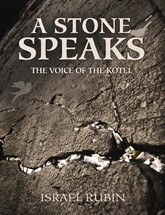Chanukah in the voice of a stone at the Kotel
With Jerusalem at the center of events affecting the safety of our people in the Holy Land, with the centrality of the sacredness of the city itself being the focus of questionable attention, it is fortuitous that a book was recently released that addresses the holiness of the Temple Mount in the simple voice of a stone from the Western Wall. The use of a stone as the voice of our faith is noteworthy in that Chanukah’s theme song, Maoz Tzur, gives rise to a stone metaphor.
“A Stone Speaks: The Voice of the Kotel,” by Cooper Union graduate Israel Rubin (Mosaica Press, 2014), presents in a chronological sequence the voice of a Kotel stone’s impressions of the site’s history, from the construction of the Kotel to this very day.
According to the author, in the voice of the stone, “This book is an outpouring of the flood of images that have filled my mind over the past twenty centuries. No camera has ever been invented that can capture all that i have seen and experienced. I have encountered the full spectrum of happenings — from the sad, heartbreaking, and distressing to the happy, joyful, and lively — that have marked the years. I have chronicled every episode and can verify its authenticity. … I have been blessed with an extraordinary memory, as you shall soon see.
“The divine presence has never left us stones of the Western Wall.”
Through this unique narrative the reader can follow history in an attention grabbing medium that will surely enhance one’s appreciation of the devotion that the Kotel has enjoyed for all these 2033 years.
Given the time of year, this essay will focus upon the era of the Chanukah story as well as a segment of the modern day Chanukah experience at the Kotel, all as ‘’witnessed’’ by the stone.
T
his pre-Chanukah narrative focuses on 169 to 164 BCE. It goes as follows, according to the stone’s eyewitness account.
“Forced Hellenization emerged when Antiochus Epiphanus assumed office. Prior to that time, Jews in Judea enjoyed relative freedom and, as a result, many Jews chose to assimilate.

 51.0°,
Fog/Mist
51.0°,
Fog/Mist 




